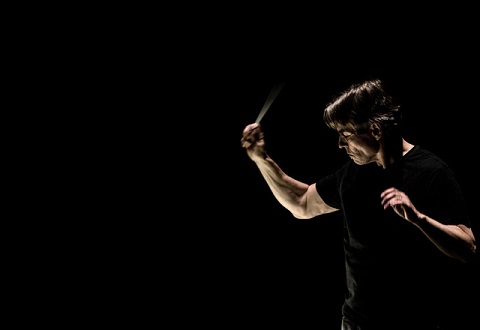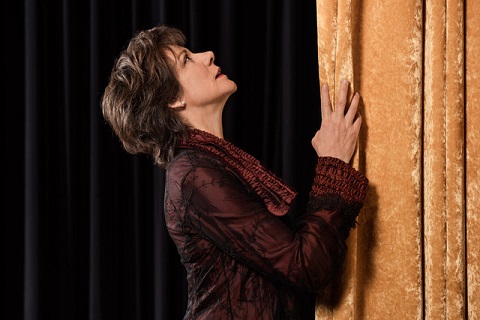The final scene of Strauss’s Salome almost touches the edges of
this musical form; indeed, this scene is often performed outside its opera
in concert so one might be persuaded this is where the twentieth century
monodrama evolves into its own genre. Erwartung, Schoenberg’s
epochal psychological musical drama from 1909, goes very much further than
Strauss, however: It’s openly Expressionist, deeply psychoanalytical,
ambiguous in its narrative, terrifying in its musical language and flickers
between dream and nightmare.
The link between these two concerts given by the Philharmonia Orchestra was
not in the slightest tenuous; indeed, a lot conjoined the music rather than
distinctly separated it. Although almost a century of music exists between Erwartung and the two works by Zender and Manoury - written
respectively in 2001 and 2004 - one was drawn back into the past - no
matter how obliquely - even if the musical language often felt distinctly
more advanced. Hans Zender’s Cabaret Voltaire, for example, uses a
text by the Dadaesque poet Hugo Ball: The text itself is almost
meaningless, a complete inversion of language, though as you listen to it
occasionally you’re struck by its Germanic tone: “großgiga m’pfa habla
horem”. There is a linguistic geometry to much of poetry; the entirely
original vocabulary, the use of repetition, the combination of consonants
or vowels in close proximity to one another (“bschigi bschigi” or
“a-o-auma”) are themselves music. Hearing Zender’s Cabaret Voltaire was not unlike reading, or listening to, James
Joyce’s Finnegan’s Wake.
Zender’s music, on the other hand, is distinctly ascetic, even spiky.
Scored for a small chamber ensemble, this is music that coalesces around
the consonantal hardness of the text; a cello or violin bow screeches or
scratches against a string, a trombone is muted. The voice itself is
treated in virtuosic terms - and it clearly requires a soloist calibrated
to sing outside the standard operatic repertoire. Salome Kammer was simply
breath-taking to listen to: The vocal acrobatics, the range and breadth of
her dynamics, the sense that she has lived with this text were obvious.
Only once in the entire work does Zender really plummet the depths of human
emotions - in ‘Todenklage’ - and here the intensity and darkness of
Kammer’s voice, as well as the soloists from the Philharmonia, really
excelled in changing the atmosphere of the work.
I think Philippe Manoury’s Blackout is rather closer to
Schoenberg’s Erwartung, both in its narrative and musical
language. It tells the story of a woman who gets in a lift which then gets
stuck during a power cut. As she waits in the darkness, her mind is forced
into an emotional state of memory and dream. Manoury tells the story in
real time over a period of twenty minutes - so, we get the rapid speed of
the escalation of the lift contrasted with the slow-motion depiction of the
narrator’s state of mind. Daniela Langer’s French text could be said to
have its origins in Walter Grauman’s 1964 psychological thriller, Lady in a Cage, though the way she has written the text in
prose-form suggests a nod towards the monodramas of Samuel Beckett.
Manoury writes for a slightly larger ensemble than Zender does but the
expressionism is still there in spades. The febrile string writing,
underscored by nervousness in the woodwind, dig deep into the psychological
darkness of a mind in dream-mode. The music feels like elastic at times -
it pulls between tempos that are fast and slow, and this is somewhat
reflected in the narration of the text. A crackled recording of Ella
Fitzgerald interjects. I don’t think this music requires the contralto
Hilary Summers to use the full range of her quite remarkable voice, but she
is never strained by the demands the music makes on her either. I found
some of her French a little on the prosaic side, but she successfully
navigated the internal psychology of the narrator’s mind to beautiful
effect.
 Esa-Pekka Salonen. Photo Credit: Minna Hatinen.
Esa-Pekka Salonen. Photo Credit: Minna Hatinen.
The Philharmonia Orchestra’s opening concert of their autumn season,
conducted by Esa-Pekka Salonen, placed Schoenberg’s Erwartung in
the middle of their programme. Schoenberg has always played to Salonen’s
strengths, and so it did here. He treats this work as one of the great
pillars of Modernism and there is much in his conducting of it that brings
out the psychosis, lamentation and darkness of this monodrama. The fluidity
he brings to the score, over its half-hour span, is quite remarkable - the
contours of the music are almost unbroken, even if the trajectory of the
narration never is. The changes in tempo and meter are so perfectly judged
you almost feel as if this is a musical form of linguistic
stream-of-consciousness. There is, however, one powerful impression one is
left with in a Salonen performance of this work, and it’s a somewhat ironic
one. Erwartung is a towering affirmation of Expressionism, but
Salonen draws playing of incredible beauty from the Philharmonia Orchestra
it seems to stand in opposition to the work’s more powerful emotive
strands. I’ve rarely heard such refined woodwind playing as we got here -
but this has long been a hallmark of this orchestra. It wasn’t necessarily
out of place, but this came close to bordering on Romanticism.
It was left to the soloist - the outstanding Angela Denoke (replacing at
short notice Camilla Nyland) - to raise this performance to the quite
exceptional. Denoke brings despair, fear, madness and complete immersion
into the psychological confusion the narrative demands. Her timbre
resonates with darkness and ambiguity, but get to the upper range of her
voice and the angst is shattering. One of the difficulties of a concert
performance of this piece is it can sometimes lack the dramatic element it
needs - Denoke, however, is consumed on stage in front of an orchestra
using the colours of her voice to convey the moonlit streets, dense
woodland or meadows and paths. The voice is entirely an expression of what
Schoenberg termed his “Angst-dream”.
I’m not sure the rest of the Philharmonia’s concert was quite as memorable.
“Siegfried’s Death and Funeral March” from Götterdämmerung, if
notable for some superlative brass playing (especially a quartet of
splendid Wagner tubas) avoided the pitfall of being overly lugubrious but
sacrificed some of the music’s clarity of orchestration - I missed the
transparency in the harps (pretty much inaudible), and the woodwind
phrasing wasn’t plaintive enough, though I think much of this was due to
the orchestral balance being somewhat overwrought. It did, nevertheless,
feel cohesively dramatic. I think the best - and probably the worst - one
can say about Salonen’s Bruckner Sixth Symphony was that it was utterly
unique. If the opening of the first movement barely touched on Bruckner’s Majestoso tempo, Salonen’s intention was to take the rest of it at
a sprightly allegro. Even if the playing was largely razor-sharp
rhythms weren’t, and string bowing was notably messy. Oddly, the Adagio was taken in tempo and it was a highpoint of the
performance (Tom Blomfield’s oboe solo being exquisite). The Scherzo achieved a neat symmetry of balance - with a fluid Trio
section - but come the Finale the performance fell out of tempo
again. The coda was undeniable exciting, but this was an extraordinarily
mysterious Bruckner Sixth in almost every sense.
Marc Bridle
Hans Zender: Cabaret Voltaire for voice and ensemble (UK premiere)
- Salome Kammer (vocal artist); Philippe Manoury: Blackout - Monodrama for contralto and ensemble (UK premiere) - Hilary Summers (contralto), Philharmonia Orchestra soloists, Pierre-André Valade (conductor)
Purcell Room, London; 27th September 2018.
Wagner, Schoenberg, Bruckner - Angela Denoka (soprano), Philharmonia
Orchestra, Esa-Pekka Salonen (conductor)
Royal Festival Hall, London; 27th September 2018.

